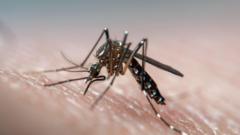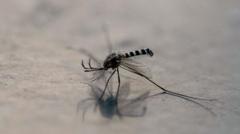Researchers from the University of California have successfully engineered male mosquitoes to become deaf, impeding their mating habits and potentially reducing the population of dengue virus-carrying insects. This novel method opens new avenues for genetic control strategies to tackle mosquito-borne diseases.
Silence is Golden: Genetically Altered Male Mosquitoes May Combat Disease Spread

Silence is Golden: Genetically Altered Male Mosquitoes May Combat Disease Spread
Innovative genetic tactics silence male mosquitoes, thwarting their mating ability and yielding potential pathways to control dengue and other mosquito-borne diseases.
In a groundbreaking discovery, scientists have devised a unique strategy to curb mosquito-borne diseases like dengue, yellow fever, and Zika by rendering male mosquitoes deaf, thereby significantly hindering their mating processes. A team from the University of California, Irvine, conducted research on the Aedes aegypti mosquito species, notorious for transmitting viruses that infect around 400 million people annually. The conventional mating ritual among mosquitoes involves relying heavily on auditory signals, specifically the distinct wingbeats of potential female partners.
The researchers focused on manipulating a genetic pathway that underpins the hearing mechanics of these mosquitoes. Specifically, they targeted the trpVa protein, known to be crucial for sound detection. As a result of this genetic alteration, the male mosquitoes exhibited an inability to respond to the flight tones or wingbeats of females, effectively leading to a complete breakdown of their mating behavior. In stark contrast, wild-type males were quick to copulate and successfully fertilized nearly all females in their vicinity during the study, which lasted over three days.
Publishing their findings in the journal PNAS, the researchers underscored that their genetic modifications led to an "absolute" elimination of mating interactions among the engineered deaf males. Dr. Joerg Albert, a noted expert on mosquito reproductive behaviors from the University of Oldenburg in Germany, emphasized that targeting the auditory faculty of mosquitoes is a promising avenue for developing effective mosquito control methods. While commending the research, he cautioned that further studies and the management of ecological risks are essential, as the ability of males to chase females is critical for their reproduction.
Although exploring alternative strategies such as releasing sterile males in regions plagued by disease is underway, it is pivotal to consider that mosquitoes play an essential role in the ecosystem, serving as food for various animals and as important pollinators. Such findings not only promise advancements in public health strategies but also highlight a need for a nuanced approach when addressing mosquito control to balance ecological interactions.





